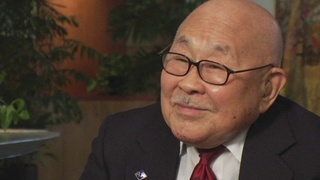Entrevistas
Asian Stereotypes
The stereotyping of people, specifically Japanese Americans, or the Japanese, I think, has played a powerful role in shaping who we are, and what we have become. And what we will be.
When Asians first started coming to the United States, they had discrimination from the outset. Immigrants coming from Asia could not become naturalized. So they were, by law, made foreigners in this country. And the Alien Land Law was passed, which denied land acquisition for, the term was, “Aliens ineligible for citizenship,” which meant Asians. But the word Asians wasn't used.
These laws, and these attitudes, were based on stereotypes that they had of Asians. And those stereotypes were reinforced by the stage plays at that time, by the newspaper cartoons at that time. And as society and the media grew, it became a part of the movies and part of songs stereotyping Asians. Stage plays that stereotyped Asians. And so when internment came down, it was those stereotypes that contributed to the hysteria of getting rid of the Japs from the west coast. During the war time, Chinese played the roles of Japanese. Those stereotypes. Asians rented out our faces to contribute to the maintenance of that stereotype. These stereotypes were created by whites that had no understanding of who we were as people. It was their vision of us, colored by the politics of that time. We contributed our faces to that.
But now things are changing. We have filmmakers now, who are Asian American. Writers. Producers. Directors, who are Asian Americans. As well as actors, who are Asian Americans. We are now telling our story from our perspective, in our voices, with our faces. And the faces are rooted in their genuine experiences. So we've made tremendous progress. We have television series now that depict Asian families. I haven't seen it yet, but I'm looking forward to Fresh Off the Boat. I have a couple of friends on that series. So we're making great progress. We need to now develop what I think are Asian American bankable stars, so that feature films now can be told from our perspective, in our voices.
Data: February 3, 2015
Localização Geográfica: California, US
Entrevistado: John Esaki, Janice Tanaka
País: Watase Media Arts Center, Japanese American National Museum
Explore More Videos

Discrimination in San Francisco
(1914-2015) Líder Nissei da YMCA e da comunidade nipo-americana

Uma coleção de artefatos mostrando estereótipos raciais influência a arte (Inglês)
(n. 1939) Pintor, artista gráfico e professor nipo-americano

Deparando-se com a discriminação racial em uma piscina pública (Inglês)
(n. 1923) Nissei de Washington. Recusou-se a se alistar durante a Segunda Guerra Mundial

Sua raça confere mais credibilidade a seu depoimento (Inglês)
(1922 - 2005) Ex-oficial do serviço de contra-espionagem

A discriminação sexual na área da educação (Inglês)
(1925 - 2018) Professora nisei do Havaí

A primeira impressão da cidade de Nova York na época da guerra (Inglês)
(n. 1915) Florista Nissei que se fixou em Nova York depois da Segunda Guerra Mundial. Integrante ativo do movimento sobre direitos civis dos Nipo-Americanos

Não trazendo vergonha para a família (Inglês)
(1926 - 2012) Estudioso e professor de antropologia, liderou a fundação de estudos étnicos como disciplina acadêmica

Laços do passado à situação atual no Oriente Médio (Inglês)
(1926 - 2012) Estudioso e professor de antropologia, liderou a fundação de estudos étnicos como disciplina acadêmica

Não tinham direitos que os brancos tinham (Inglês)
(1922–2014) Ativista política e de direitos civis.

Californianos não tinham conhecimento sobre a desocupação (Inglês)
(1922–2014) Ativista política e de direitos civis.

Sua experiência como estudante nippo-americana no Oceanside, California, depois do bombardeio a Pearl Harbor (Inglês)
(1924-2018) Artista e escritora teatral

Mudança de atitudes após a Segunda Guerra Mundial (Inglês)
(1924 nascido) Cientista politico, educador, e administrador de Hawai`i

Pensamentos no ambiente pós 11/09 nos E.U.A (Inglês)
(1930-2018) Nissei, nascido no Peru. Levado para os Estados Unidos durante a Segunda Guerra Mundial

Lidando com racismo na unidade do exército na Korea (Inglês)
(n. 1939) Pintor, artista gráfico e professor nipo-americano

Tomando a decisão de resistir ao plano (Inglês)
(n. 1923) Nissei de Washington. Recusou-se a se alistar durante a Segunda Guerra Mundial
